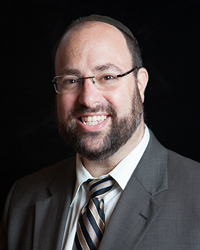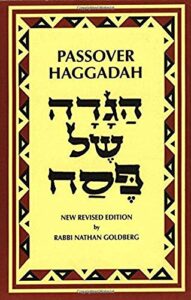 In this second Passover during the COVID pandemic, we know that many a seder will look and feel different than it used to, and some may be struggling to contemplate Passover altogether. We hope that you turn towards the Festival of Freedom, filled with hope for a future free from sickness, together with friends and family. May we enter Pesach this year with these songs in our hearts and on our lips. Chag kasher v’sameiach.
In this second Passover during the COVID pandemic, we know that many a seder will look and feel different than it used to, and some may be struggling to contemplate Passover altogether. We hope that you turn towards the Festival of Freedom, filled with hope for a future free from sickness, together with friends and family. May we enter Pesach this year with these songs in our hearts and on our lips. Chag kasher v’sameiach.

Page numbers refer to those in the maroon-and-gold “Passover Haggadah”, Revised Edition, by Rabbi Nathan Goldberg.
Vocals by Cantor Jason Green; Piano accompaniments by Stephen Glass.
The order of the seder ceremony, set to a memorable melody, particularly important for teaching children the steps of this unique festive meal. p4
The sanctification of the Pesach meal. In this version of Kiddush (specifically for Passover when it does not coincide with Shabbat), in addition to thanking God for creating the fruit of the vine, we praise God for designating for us the festive seasons, gifting us the Torah, and taking us out of Egypt. p5-6
A prayer in Aramaic, the popular language at the time of the compiling of the Haggadah, inviting all who are hungry to come join the seder and eat of the bread of affliction, while looking ahead with anticipation to future freedom. p8
The “four questions” (actually, four statements) about how the seder is different than any other meal. Usually sung by the youngest family member who can learn it. p8-9
A very succint summary of the Exodus story to begin the ‘answer’ to Ma Nishtanah – “We were slaves… now we are free.” p9
A praise of God for saving us from the hands of many enemies throughout our history. p12
“It would have been enough…”, a poem showing appreciation to God for all of the miracles required to take us from slavery to freedom, to the giving of Shabbat and of Torah. p19-20
An excerpt from the Hallel prayers indicating that the Exodus was so miraculous that even nature celebrated it. This version is the beloved call-and-response melody. p25, end of line 7
A Song of Ascents, the introductory paragraph of the Birkat HaMazon, Grace After Meals. This composition is by Yossele Rosenblatt, one of the most famous Cantors of the Golden Age of Chazzanut (approximately between the two World Wars). p28
The first paragraph of Birkat HaMazon, Grace After Meals, in which we praise God for sustaining us with food, and in a sense, the hope that God will provide plenty for all on Earth. p29, line 2
A concert-style choral arrangement of the prayer in Birkat HaMazon seeking God’s mercy and protection in light of all our troubles. This setting features Cantor Stephen Robins, with Cantor Green leading the Tenor section. p29, line 18
After drinking the third cup of wine, we symbolically open the door to allow Elijah the Prophet to enter and herald the coming of the Mashiach. The text of the song appears in the songsheet which is the very last printed page of this Haggadah.
We continue the Psalms of the Hallel service, including Psalm 115 (verses 12-18), which praises God and asks us to continue doing so eternally. p34, line 10
This concert composition by Ya’akov Talmud, from Psalm 117, asks all nations to Praise God. p35, line 10
From the Hallel service, this is the audio track from the first Virtual Choir Video produced by KBI’s choir (Kol Beit Yisrael). In it, we praise God for “answering us… This is the day God created: let us be glad and rejoice on it!” p36, line 9
One of the latest additions to the traditional Haggadah, this hymn is an acrostic of the Hebrew alef bet mirroring the language of Adir Hu (below), stating that all of our praises of God are both fitting and due. While there are eight stanzas in the hymn, this version contains the first four. p41
At the conclusion of the seder, we pray that we may be reunited next year with all Jewry, present and past, in Jerusalem. p43, line 14
Another acrostic hymn, this text which is nearly identical to that in Ki Lo Na-eh, focuses on asking God to act “soon”. p44
A teaser of the children’s song made famous by Cantor Moishe Oysher, an allegory for the enemies that have risen up against Jews through history. p47, line 11
Not part of the Haggadah but rather the special Prayer for Dew chanted on the first morning of Passover, this composition by Stephen Levey is a moving duet that reminds God of the water God so generously provided for the sustenance of our People and our Land through history, a continuing necessity to this day.
The download button should appear in the menu bar at the top of the browser tab that opens. All songs will download in one .ZIP file.